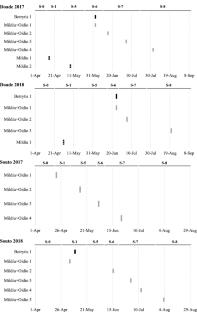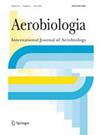The special characteristics of heroic viticulture combine the geographical features of the territory where particular vineyards are located and the unique production methods used in making their wines reflected in their status as special protection zones. This work sets out the results of a 2 year project in which the impact of the main cryptogamic diseases affecting vines in the Ribeira Sacra designation of origin (northwest Spain) was studied. The incidence of such diseases was assessed to develop strategies for offsetting the high costs incurred by production and the adverse impact on the environment. For this purpose, an aerobiological study of the fungal propagules during the life cycle of the red Mencía variety was carried out. The spore concentrations were correlated with the phenology, climatic conditions and the application of anti-fungal treatments. The analysis shows that greater effectiveness can be achieved in the control of phytopathogenic fungi by means of better identification of the epidemiological development of the pathogen. The determination of the right moment for the application of phytosanitary products is also considered, as well as the correct and most effective doses, and alternative measures that do not involve the use of phytosanitary products. The study contributes to the sustainability of the crop area by seeking to integrate three fundamental dimensions: the societal context, the economy and the environment.



